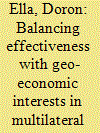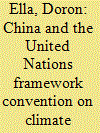|
|
|
Sort Order |
|
|
|
Items / Page
|
|
|
|
|
|
|
| Srl | Item |
| 1 |
ID:
185557


|
|
|
|
|
| Summary/Abstract |
Since its inception in December of 2015, scholars and policy-makers have been debating the motivations behind the design of the AIIB. This paper advances this debate by exploring whether and how the AIIB’s structure follow the design pattern of other leading MDBs, and how well did it manage to integrate institutional effectiveness considerations with promoting its largest shareholders’ geo-economic interests. It does so by comparing the design of the AIIB with that of the ADB and the World Bank, while integrating several approaches to institutional design. I argue that the AIIB’s architects identified certain functional deficiencies in the performance of existing financial institutions and attempted to establish an alternative that will better address these deficiencies. To achieve that, they tried to balance between certain structural features that promote institutional performance with features that promote powerful creditors’ geo-economic interests, as well as invest in AIIB’s attractiveness vis-à-vis other financial institutions. This paper finds that in multilateral development banks power considerations tend to overshadow issues of institutional effectiveness, while sometimes these are successfully integrated. And, that powerful actors are able to politicize certain functional design features and reassign their purpose from solving cooperation problems to advancing geo-economic interests.
|
|
|
|
|
|
|
|
|
|
|
|
|
|
|
|
| 2 |
ID:
153126


|
|
|
|
|
| Summary/Abstract |
This article examines how categorization mechanisms of the United Nations Framework Convention on Climate Change (UNFCCC) have affected the dynamics between China and other member states during the process of environmental negotiations, and how this categorized institutional environment influenced members’ bargaining positions during the studied period. It argues that by categorizing it as a non-Annex I Party, the UNFCCC conferred on China a context-specific role of a developing country and legitimized its reluctance to abide through legally binding commitments. Yet, as China’s capabilities changed, its institutional role as a developing country was perceived by other member states as inappropriate. Consequently, various member states, such as the United States and the European Union, expected China to enact the role of a rising power, which meant abiding by legally binding commitments and abandoning its current category group. Furthermore, during these negotiations, both China and other member states utilized the UNFCCC’s categorization mechanisms, by emphasizing institutional categorical positioning, in order to enhance their bargaining power. Therefore, this article illustrates how the parties to the Convention were able to reach a successful, binding, and inclusive agreement in Paris.
|
|
|
|
|
|
|
|
|
|
|
|
|
|
|
|
|
|
|
|
|